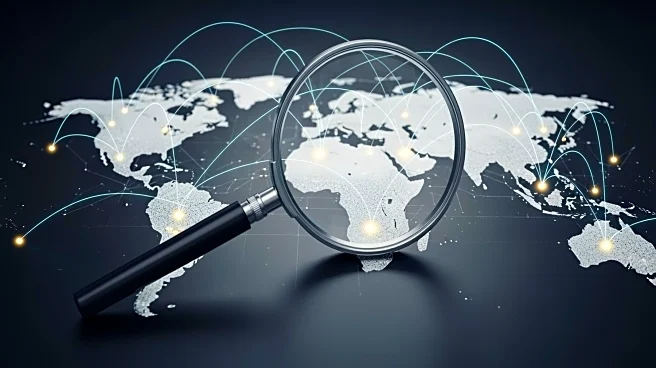What's Happening?
A major investigation has revealed the existence of a global surveillance network capable of tracking individuals worldwide. The investigation, led by reporter Gabriel Geiger and Lighthouse Reports, uncovered a vast archive of data detailing over a million
tracking operations. These operations were conducted using sophisticated phone-tracking software provided by a company named First Wap. The software was capable of pinpointing the real-time locations of thousands of people, including politicians, journalists, and executives. The investigation was furthered by an undercover journalist who attended ISS World, a trade fair for police and intelligence agencies, where Guenther Rudolph, an executive from First Wap, discussed the capabilities of their technology with a prospective client. The client, a private mining company owner under sanction, intended to use the technology to surveil environmental protesters.
Why It's Important?
The exposure of this surveillance network highlights significant concerns regarding privacy and the potential misuse of technology. The ability to track individuals globally poses a threat to personal privacy and civil liberties, raising ethical and legal questions about the extent of surveillance permissible by private entities. This revelation could impact public policy and lead to increased scrutiny and regulation of surveillance technologies. Stakeholders such as privacy advocates, legal experts, and policymakers may push for stricter controls to prevent abuse and protect individual rights. The mining company's intent to use the technology against environmental protesters underscores the potential for such tools to be used to suppress dissent and activism.
What's Next?
The investigation's findings are likely to prompt reactions from various stakeholders, including government agencies, privacy advocates, and international organizations. There may be calls for regulatory reforms to address the unchecked use of surveillance technology by private companies. Legal actions could be initiated against entities found to be using such technology unlawfully. Additionally, there may be increased efforts to develop and implement privacy-protecting measures and technologies to counteract invasive surveillance practices.
Beyond the Headlines
The broader implications of this investigation extend to the ethical considerations of surveillance in the digital age. The balance between security and privacy is a contentious issue, and this revelation may fuel debates on the moral responsibilities of companies that develop and sell surveillance technologies. The potential for these tools to be used for political or economic gain at the expense of individual freedoms could lead to a reevaluation of international norms and agreements on surveillance and privacy.















